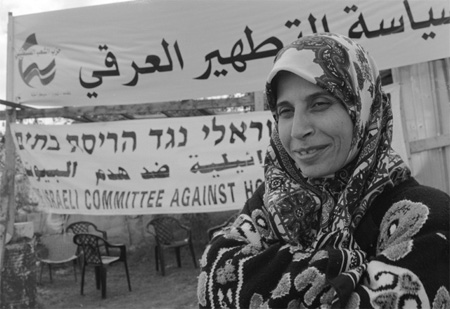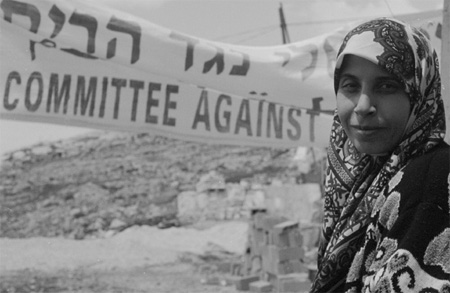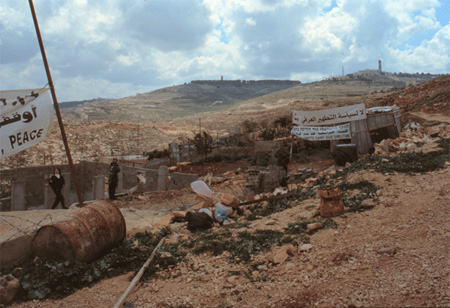
|
 |
|
'Arabiyya al Shawamra in front of a banner that reads, in Arabic, Hebrew and English, "Committee Against Home Demolitions", Anata near Jerusalem, April 1999. Photo: Leena Saraste |
| Salim and 'Arabiyya Shawamra, Anata, April 1, 1999:
|
 |
|
'Arabiyya al Shawamra standing near her twice-destroyed home, Anata near Jerusalem, April 1999. Photo: Leena Saraste |
|
In April 1999 I'm in Jerusalem with the photographer Leena Saraste. K., the friend who took me to Nabi Samuel in 1998, tells us about a recent home demolition in a village called Anata, just outside Jerusalem's present municipal boundary, and offers to take us there. 6 Home demolitions have recently been speeding up in all the villages close to Jerusalem, in preparation for the 'Greater Jerusalem' that is already planned, which is expected to extend the area of the city to an area of 300 square kilometers carved out of the West Bank.7
Anata is some way beyond Shu'fat camp (a small UNRWA camp inside Jerusalem's municipal boundaries). The village itself is small. We drive beyond it to a bare rocky hillside, facing towards the city. There are a few houses, thinly scattered, along recently built roads. Two of them have recently been demolished. In the distance are tin shacks inhabited by bedouin. We pass the demolished houses and come to a new unroofed house structure. Beyond it there's a one-roomed shack of planks with a zinco roof, and a banner across the entrance proclaiming in Araic, English and Hebrew "The Movement Against Ethnic Cleansing". In front of the shack is a small space with grass and five plastic chairs. Here live the Shawamras, a family of eight, Salim and 'Arabiyya, with their six children. Their home has been demolished twice and twice rebuilt. The rebuilding has been done by volunteers, many of them Israeli. All that is lacking now is the roof. I record with Salim first.
Salim Shawamrah: |
house in the camp was full, it wasn't possible for us to live in the house because my brothers and their children were there, a large number of people were living in it. It wasn't possible for us to live in the house in the camp. We decided to buy a piece of land and build a house on it. The money that we brought back from the Gulf after eight years' work, we went and bought this piece of land with it, that we're on right now. We tried to get a license from Beit El, from the Israeli administration. The first time we applied for a licence they refused, with the senseless pretext that the land is outside the limit of the Master Plan. But there isn't any Master Plan for the Palestinian villages, it was all just talk. And the second time also they refused a license, also on a senseless pretext. We applied a third time, and again they refused us a license..."
K. told us as we were driving to Anata that 'Arabiyya has suffered a breakdown. Usually I don't ask many questions when I'm recording, but try to let speakers tell their own stories. But with 'Arabiyya I make a real mess of things, interrupting her twice, the second time just as she's about to tell me about her breakdown. If it's a guilt reaction, I should be in better control of it by now. Every recording I'm doing evokes memories of home loss.
'Arabiyya Shawamrah speaks: |
 |
|
Anata, Jerusalem area. Destroyed house of Shawamra family. Photo: Leena Saraste More photos |
[Umm Muhammad Jamal Ronani] [Hajj Khalil Bseiss] Copyright©2005 |
|